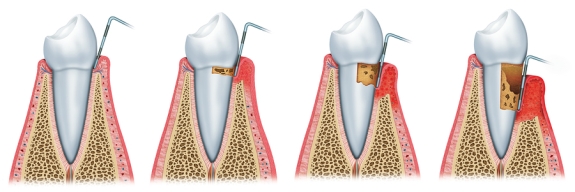UNDERSTANDING THE STAGES OF GUM DISEASE
Your oral health is important for your entire body—not just for your mouth. Brushing and flossing on a daily basis and visiting your Belmont dentistregularly can help fight off tooth decay and gum disease. Though the early stages of gum disease may seem quite minor, they can progress and become much more severe if left untreated. Advanced cases of gum disease can lead to shifting teeth and even the need for tooth extraction. Keep reading to understand the different stages of gum disease.
Gingivitis
Gingivitis is the earliest stage of gum disease, and is completely reversible with proper at-home care and visits to your periodontist. When plaque builds up on your teeth around the gum line, it irritates gum tissues, causing them to become red, swollen, and sensitive. You may notice a bit of bleeding when you brush or floss if you have gingivitis, even if you are gentle with the toothbrush. In this early stage, the best thing you can do is be vigilant about your dental health. Be sure to brush your teeth at least twice a day, and floss every day to remove as much plaque as you can.
Periodontitis
If you ignore the early signs of gum disease and continue to have relatively poor oral health habits, gingivitis will progress into periodontitis. In gingivitis, the bone and connective tissues that hold your teeth in place are not affected. Once gingivitis advances to periodontitis, however, your bone and connective tissues are irreversibly damaged. A pocket may form beneath the gum line which can trap food particles and plaque, and make the situation even worse. At this point, you should see your dentist for treatment.
Advanced Periodontitis
This is the final stage of gum disease, and it can permanently affect the way you look, speak, and chew. Bone and connective tissues are destroyed in advanced periodontitis, which can cause your teeth to move and become loose. Even with proper treatment from a periodontist, there is a risk that your teeth will have to be removed if gum disease is allowed to progress this far. If this happens, you may require more advanced treatments, like dental implants.

When you have your routine dental cleaning and exam, you may think your dentist is only checking on your teeth and oral health. While we do…
Oh no, your tooth is damaged! This damage may be the result of a chip, a break, or decay. No matter the cause, Belmont Dental Group is here to…
